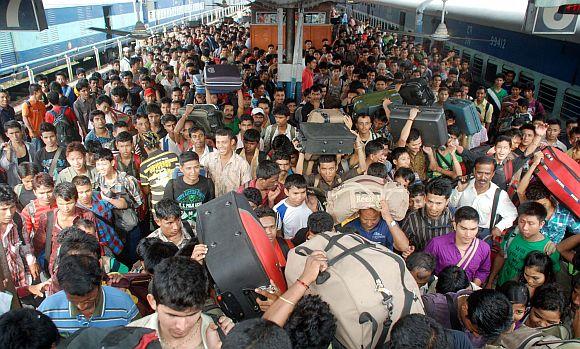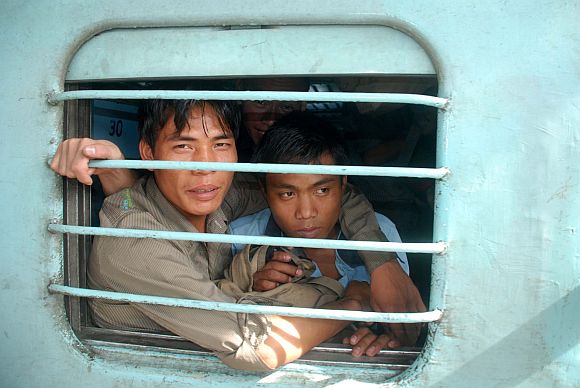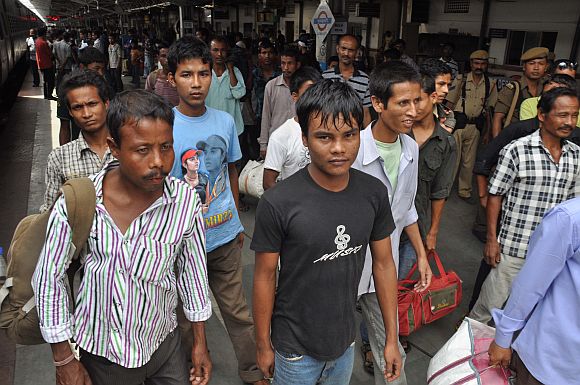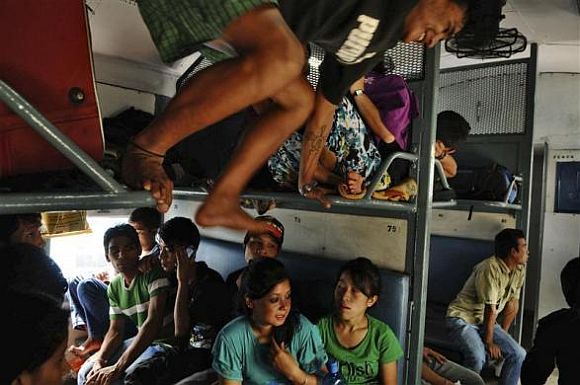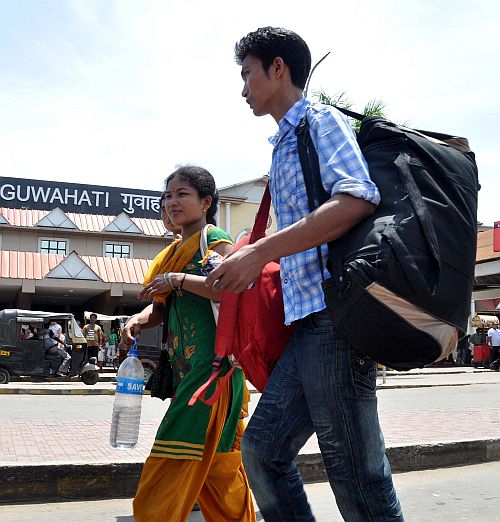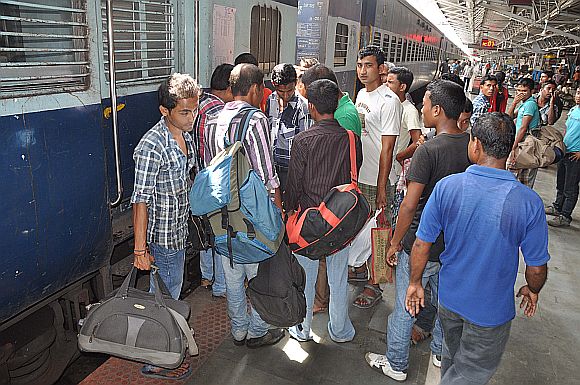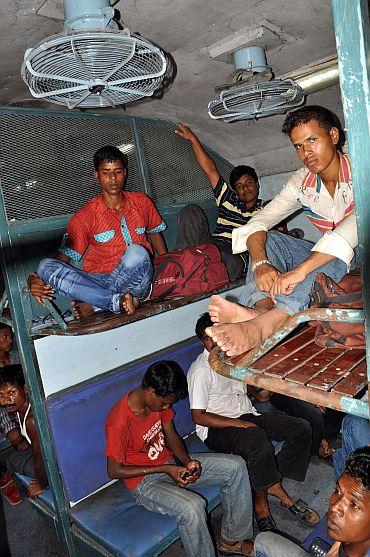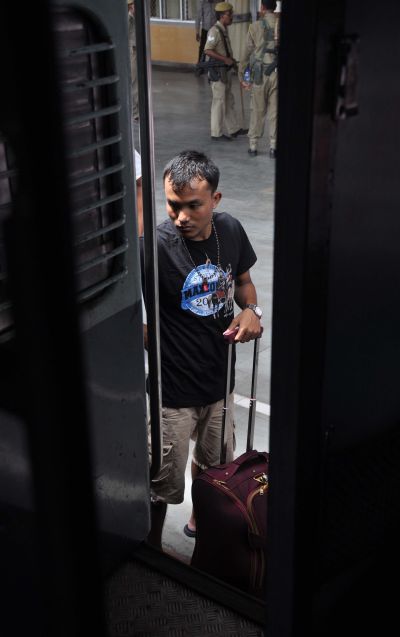 | « Back to article | Print this article |
Voices from the northeast: 'The scare will always remain'
Chitra Ahanthem reports on how students from the northeast, who fled Bengaluru after rumours of attacks on them in retaliation of Assam riots, are coping with the situation now that the tension has eased and many who fled the city have started trickling back.
Div Musahary, a 20-year-old student from Nagaland's Dimapur district, didn't want to leave Bengaluru on August 16 this year.
Thousands of his compatriots from India's north-eastern states were going back to their respective states in the aftermath of attacks on them in Bengaluru, apparently in retaliation to attacks on Bangladeshi migrants in Assam.
The situation had worsened further after text messages started doing the rounds that there would be more attacks on people from the north-east -- easily identified because of their Mongoloid features -- after Eid.
Div, however, was unperturbed by the turn of events. For, being a final year BA student at St Joseph's College of Arts & Science in Bengaluru, he had better things to do than run away from the city. Parental pressure, though, made him change his mind.
"My parents, worried about my safety and security, pleaded with me to come back home," Div states why he left the city. But instead of going to Dimapur he went to Delhi where he thought he would be safe among the large number of student community there from the north-east.
Additional inputs by Prasanna D Zore
Click on NEXT to read further...
'Now that I have seen it once I am experienced to handle such a situation'
Div returned to Bengaluru on August 30 when the "situation became normal" after spending almost 10 days in Delhi.
Interestingly, he says, he did not miss much on his classes and studies as many colleges allowed students from the region a holiday of 10 days.
"That was a great help and I appreciate the precautions that many colleges took to shield the north-east students from the insecurity of impending attacks."
He says the experience has made him wiser and he would be better prepared in case of a similar eventuality later if rumours that were floating mid-August were to come true.
Ask him if he feels deterred and scared now to move freely in Indian cities outside the north-east and he says, "Not exactly. I have plans to work in Bengaluru or wherever I find a job after my education because these are one-off instances and now that I have seen it once I am experienced to handle such a situation."
Div has clearly taken the incident lightly and doesn't feel like an alien in his own country because of his Mongoloid features.
As a student and young Indian who would soon be entering the job market, Div says the attack on the people from the north-east in retaliation to riots in Assam would not make him feel unsafe or insecure in any Indian city outside of the north-east.
Click on NEXT to read further...
'We can't move freely now in the dark'
Fortunately, Div's views were echoed by all the students rediff.com spoke with for this story indicating that the retaliatory attacks have not, in any way, altered their views about their safety and security in Indian cities. Equally importantly, most of them said they were open to work in any Indian city or town that work would take them to.
Johnny Khonglah from Shillong, Meghalaya, who studies business management at Kristu Jayanti College, Bengaluru, did not accompany many of his friends who went back after the August incident.
Though there was no disturbance around the hostel near Sarjapur area he stays in, there was a sense of fear but Johnny decided to stay put. Many of his friends went back but are now back in Bengaluru.
"The students who left after the rumours would lose out on their studies and miss classes and may find it difficult to cope with their curriculum," opines Johnny, a first year student, who came to Bengaluru only a few months ago.
The only way, Johnny says, that he and others in his group of eight to nine students from the north-east have been affected is in their movements after sunset. "We can't move freely now in the dark," Johnny says.
Johnny is not sure as to where he will go -- back to the north-east or some other place in India in search of a job -- after completing his BBM.
Click on NEXT to read further...
Walls of ignorance about the region must break
The issue of alienation and racism, though, remains a concern for a majority of these students who want to take advantage of India's rapid progress in economic growth, which unfortunately has not yet percolated down to their region.
Looking distinct from the people they interact with in the rest of the country because of their features, these students often face great challenges while seeking accommodation or even in their social interactions.
The greatest challenge, of course, is to break down the walls of ignorance about the region and dispelling pre-conceived notions of morality and behaviour.
These young people who leave their homes stick it out and make their way into various sectors: hospitality, health, aviation, IT, fashion et al.
In the process, they also face alleged racial slurs and acute alienation. "Chinky" is how they are described and though most can and do react with humour, there are many others who allege that such name calling contributes largely towards a "us vs them" phenomenon.
Click on NEXT to read further...
'To an extent, we are at fault too. We are not really outgoing'
Sugam Thapa from Darjeeling, who is in his final year BA degree in St Joseph's College of Arts and Science, Bengaluru, says, "There are ways in which we have felt alienated. Those of us from the north-east have a totally different culture and our lifestyle is very different when we compare it with the people from the rest of the country. Our Mongoloid feature adds to the difference."
But the alienation, he says, is because of the tendency of the people from the region staying aloof.
"To a certain extent, we are at fault too. We are not really outgoing, most of us are shy and we prefer to be with people of our own community."
Bengaluru, the centre of mass migration of people from the north-east region, had earlier seen outrage over alleged indifference by the police in investigating the death of architecture student Richard Loitam from Manipur at Acharya NRV School of Architecture. Those protesting against the police inaction had pointed towards 'racial discrimination'.
These feelings of not belonging contributes largely to insecurity and paranoia as in the case of the mass exodus of people from the north-east region leaving Bengaluru, Pune, Hyderabad and Mumbai among other cities.
Click on NEXT to read further...
Not all sectors pressed the panic button
Anirban Dutta, coordinator of the North-east And Tibetan Forum in Bengaluru who is from Assam, says, "The attacks on north-eastern people in certain areas of Bengaluru were influenced by the unemployed youths of the city. The exodus of north-east people from the various cities of India will affect the IT industry as a whole because the lower strata of these MNCs are being managed by north-eastern youths."
Apart from activism, Anirban studies industrial relations, economics and sociology at St Joseph's College of Arts & Science, Bengaluru.
But not all sectors pressed the panic button: civil society groups, community leaders and police representatives had joint meetings to reiterate the message of harmony. But the irony of it all is that if these show of strength had happened during earlier instances of cases of harassment/assault or incidents of rape, the sense of insecurity would not have gone on to such a drastic point.
The other great irony has to be that most people from the NE region search for better avenues of studying, living and earning but mainly to get away from the shadow of guns. Yet, the very people who have made a call against the heavy militarism in the region were made to feel safe when army flag marches were conducted in Bengaluru and other metros.
The exodus of people working in the lower rungs of the hospitality and health sector and various other small business enterprises has begun to affect their employers with some outlets even closing shop temporarily while educational institutions are now taking to calling back students.
Click on NEXT to read further...
'The scare will remain; there will always be some scepticism'
Supriya Shijagurumayum, a professional from Bengaluru, which she considers her second home after Imphal, says, "The scare will remain and there will be always some scepticism. While people will get back to their normal activities after some time, those who are considering long-term employment/settlement might think twice. For people belonging to Manipur and Nagaland particularly, this would mean the one escape route from the insurgent-ridden states is gagged. In the long term this might mean there could be an influx of professionals getting into entrepreneurship etc in their states."
The number of young students waiting to board flights from Imphal and other towns in the region to seek education in metros in the midst of the current exodus of people on their way back speaks volumes about the plight of young people who have to choose between the violence of guns and bombs on one hand and the yet to happen violence contained in social networking sites and SMS-es.
"I don't think people will think twice about leaving home in spite of all the chaos that took place, because we need to meet our basic needs. For some, it is a better education and for others, it is earning their livelihood and if that requires us to leave our home, I don't think anyone will hesitate," says Sugam Thapa.
Emchirut Myrten, 20, from Shillong, Meghalaya, who studies journalism in Bengaluru is an interesting case.
He is one of the many people who went back to the north-east not because he was scared or worried about his safety but to fulfil a few family commitments.
Click on NEXT to read further...
'We don't know what might happen next'
When asked if his impression about how secure the city is to the students from the north-east has changed after the recent episode, Emchirut says, "Nothing much has changed. I don't feel insecure but on the advice of our seniors we are not wandering out too late in the night."
He says that baseless rumour-mongering fuelled by mass text messages led to the huge exodus of the people from the north-east to their respective states.
"On the ground nothing much happened except for a couple of stray incidents," he adds.
Though he is back, parents back home are worried about his well-being.
"We don't know what might happen next." But he says that the situation would change in a couple of months and he has his friends -- from the north-east as well as from Bengaluru -- would always be there for support if another bout of disturbances takes place.
Emchirut feels that moving around and staying with people of mixed ethnicity could be one of the solutions to moving freely once again in his neighbourhood without any fear. He says that the people from the city were very hospitable and he has, in his one-year stay in Bangalore, did not witness any sort of discrimination -- overt or covert.
Once he completes his journalism course he plans to move to any city or place in this country where he can get a good job.
"I don't think that the Bengaluru incident has in any way changed my impression about cities outside the north-east. I will go wherever my job takes me."
Click on NEXT to read further...
'People need to know that we are also a part of the country and not foreigners'
Anirban says the recent incidents in Bengaluru and the violence before that in Assam has left a lasting impact on this 20-year-old, final year student.
"I have begun to look at this world in a different light now. People from the north-east are not very well treated. They face problems when they seek paying guest accommodation," he says.
He thinks people are not very liberal when they transact business with people from the region. "They think of them as outsiders," he rues.
But unlike a majority of people finding fault only with others, Anirban is inward-looking.
"You can't be one-sided. A few people from the north-east created problem for some owners who rented their dwellings to them. But that has tarnished the image of the people from the entire north-east," he says.
Meanwhile, government officials and civil society groups in Bengaluru and other metros are on a confidence building drive and even arranging for chartered flights to bring back students and workers and though things will calm down after a certain period, the challenge is really to understand the NE region and its people.
Anirban sums it up saying, "India is a very diverse country with numerous languages, religions, races and many other factors. All of us should learn to respect each other's culture and traditions; respect each other and learn to live in a harmonious society free from communal hatred. The rest of the country is still ignorant of the north-eastern states. People need to know that we are also a part of the country and not foreigners."
Click on NEXT to go further...
Top PHOTO feature of the week
Click on MORE to see another set of PHOTO features...
